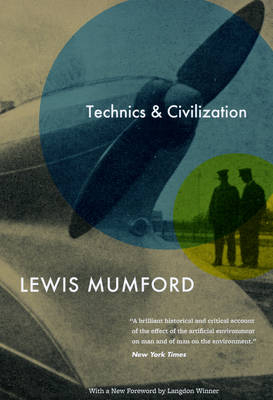
Technics and Civilization
Seiten
2010
University of Chicago Press (Verlag)
978-0-226-55027-5 (ISBN)
University of Chicago Press (Verlag)
978-0-226-55027-5 (ISBN)
Drawing upon art, science, philosophy, and the history of culture, this title explains the origin of the machine age and traces its social results, asserting that the development of modern technology had its roots in the Middle Ages rather than the Industrial Revolution.
"Technics and Civilization" first presented its compelling history of the machine and critical study of its effects on civilization in 1934 - before television, the personal computer, and the Internet even appeared on our periphery. Drawing upon art, science, philosophy, and the history of culture, Lewis Mumford explained the origin of the machine age and traced its social results, asserting that the development of modern technology had its roots in the Middle Ages rather than the Industrial Revolution. Mumford sagely argued that it was the moral, economic, and political choices we made, not the machines that we used, that determined our industrially driven economy. Equal parts powerful history and polemic, "Technics and Civilization" was the first comprehensive attempt in English to portray the development of the machine age over the last thousand years - and to predict the pull the technological still holds over us today.
"Technics and Civilization" first presented its compelling history of the machine and critical study of its effects on civilization in 1934 - before television, the personal computer, and the Internet even appeared on our periphery. Drawing upon art, science, philosophy, and the history of culture, Lewis Mumford explained the origin of the machine age and traced its social results, asserting that the development of modern technology had its roots in the Middle Ages rather than the Industrial Revolution. Mumford sagely argued that it was the moral, economic, and political choices we made, not the machines that we used, that determined our industrially driven economy. Equal parts powerful history and polemic, "Technics and Civilization" was the first comprehensive attempt in English to portray the development of the machine age over the last thousand years - and to predict the pull the technological still holds over us today.
Lewis Mumford (1895-1990) was a writer whose scope encompassed literary criticism, architecture, history, urban sociology, and philosophy. The author of over thirty books, he was also the architectural critic for the New Yorker for over thirty years. He was eventually honored with the United States Medal of Freedom and named a Knight of the Order of the British Empire.
| Erscheint lt. Verlag | 30.11.2010 |
|---|---|
| Vorwort | Langdon Winner |
| Sprache | englisch |
| Maße | 16 x 23 mm |
| Gewicht | 794 g |
| Themenwelt | Geschichte ► Teilgebiete der Geschichte ► Kulturgeschichte |
| Geschichte ► Teilgebiete der Geschichte ► Technikgeschichte | |
| Naturwissenschaften | |
| ISBN-10 | 0-226-55027-3 / 0226550273 |
| ISBN-13 | 978-0-226-55027-5 / 9780226550275 |
| Zustand | Neuware |
| Haben Sie eine Frage zum Produkt? |
Mehr entdecken
aus dem Bereich
aus dem Bereich
der stille Abschied vom bäuerlichen Leben in Deutschland
Buch | Hardcover (2023)
C.H.Beck (Verlag)
23,00 €
vom Mittelalter bis zur Gegenwart
Buch | Softcover (2024)
C.H.Beck (Verlag)
12,00 €


